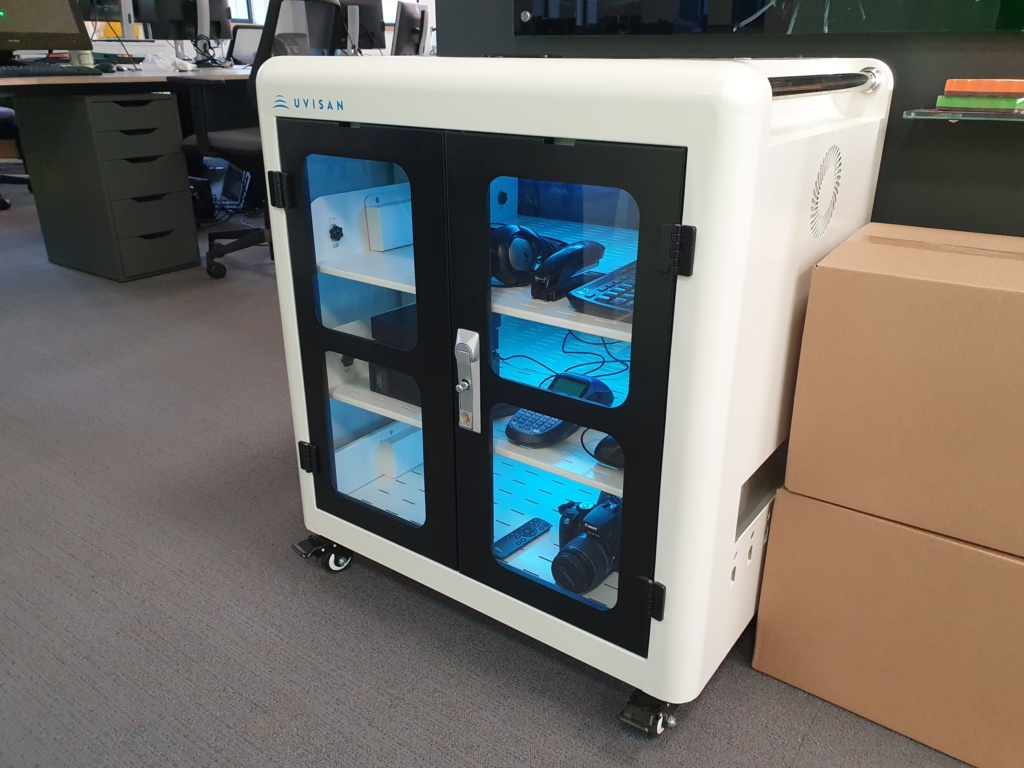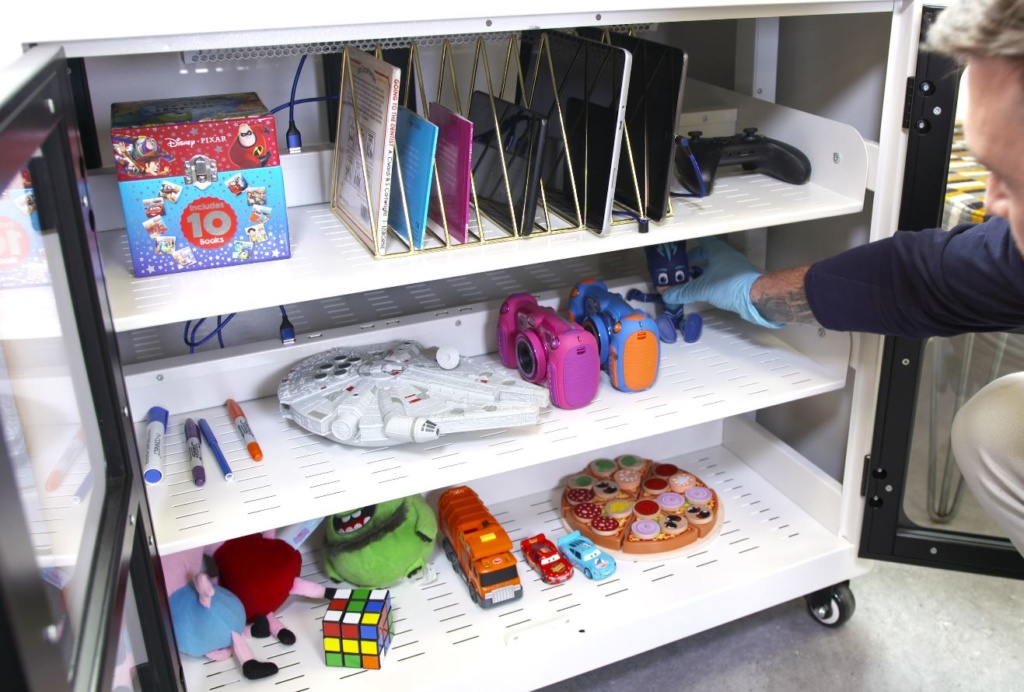
How much time will you lose between classes if you are disinfecting all the equipment in your computer room? Think about all the things children touch: headphones, chargers, keyboards, laptops, computer mice, stationery and maybe even musical instruments. When on earth will you get time to teach?
As schools reopen, senior decisionmakers in education must explore all the avenues to protect students from Covid-19 outbreaks without compromising teaching standards.
The dilemma facing schools
Students across the UK have faced an entire year of disrupted education. Vast stretches of time away from the classroom, peppered with short windows of in-person schooling limited by the confines of social distancing, mean that there is considerable catching up to do now schools have reopened for all. But not at the expense of our students’ health.
Fumigating rooms and leaving them empty for hours at a time is an unrealistic expectation because of the demands on space. Similarly, quarantining shared equipment for 72 hours between classes is incredibly impractical yet students must be protected from coronavirus and other harmful pathogens. Schools, colleges and universities that are using delicate equipment, such as iPads or filming kit, have found they cannot thoroughly disinfect it between uses as chemicals, moisture and heat will all cause damage over time.
As a result, students have had to make do with reduced resources. If this continues, education standards will continue to fall and there will be even more ground to make up in the future.
While many teachers will be facing cumbersome disinfection processes in the coming months, some institutions are implementing a virus control measure that will free up staff’s time while ensuring equipment and spaces are fully decontaminated.
What is UV-C disinfection?
Over 200 years ago people discovered that short-wavelength UV light (UV-C) could kill microbes. It is a technology that has been widely used to decontaminate water supplies since the 1950s. UV-C disinfection is now a critical step in the food and drink manufacturing process as exposure to the light will eliminate E. Coli, Salmonella and other harmful pathogens from the food product in less than five minutes.
When a surface is exposed to UV-C, an energy transfer takes place which prevents microbes under the light from replicating or from expressing the necessary proteins, leading to the death or inactivation of the organism. Medical grade UV-C lamps will kill 99.9% of microbes in just five minutes.
Science laboratories and wastewater treatment facilities use UV-C sterilisation and it has been identified as a water cleaning solution in developing countries.
Given its success in treating the products we eat and drink and preventing cross-contamination in labs, UV-C clearly has incredible potential as an infection control measure in day-to-day life. In schools, it can be used to kill pathogens on classroom surfaces or educational equipment. UV-C technology allows entire rooms to be disinfected and ready for the next class in less than five minutes and prevents delicate equipment from being damaged by wet wipes or chemicals.
It has been scientifically proven to kill bacteria, viruses, spores, protozoans, mould and yeast, so schools should consider it as a key part of their virus control plans to protect students and staff from coronavirus as well as a host of other illnesses.
Breaking a cycle of infection
Digital learning is now central to the education of many students. This year, some institutions have been forced to remove digital learning from curriculums to prevent coronavirus from being spread through shared computer peripherals, headsets and tablets.
Similarly, teachers of practical subjects such as science and music will have to find ways for multiple classes to share equipment which do not involve lengthy quarantine periods.
There are cabinets on the market that will decontaminate laptops while charging them and keeping them safe – a one stop solution to three common problems, battery life, hygiene and security. The cabinets simply need to be loaded with equipment, firmly shut and put on a cleaning cycle lasting as little as five minutes. With minimal effort, this will result in much more thorough sanitisation than human cleaning can achieve.
Schools, colleges and universities with specialist facilities containing fixed equipment, such as mixing desks in production studios, have not been able to use them safely throughout the pandemic because they cannot clean them properly.
In these instances, ambient UV-C lamps can be carefully positioned using an algorithm to disinfect an entire room, and the equipment within it, in a matter of minutes. The set up which controls the lights has in-built safety measures that prevent anyone from entering the room during the disinfection cycle,
Advantages of UV-C light?
- UV-C kills over 55% more bacteria than using wipes alone
- UV-C light is zero waste, unlike wet wipes
- It is more cost-effective in the long run
- It will clean toys in just a few minutes and make them safe
- UV-C light can be safely used on electronics, whereas wet wipes will damage them over time
- Saves time
- Schools can use equipment and rooms immediately after the cleaning cycle has finished – a matter of minutes
UV-C light in action

Hazelwood School in Surrey has been using a UV-C disinfection cabinet since the beginning of the school year. The school had to stop using the iPads initially as teachers could not reasonably be expected to disinfect the tablets between each class, but their removal from classes began to hinder teaching.
Nick Tappin, bursar at Hazelwood School said:“Ahead of the return to school in September, we purchased a Uvisan UV-C cabinet so that the bank of iPads, used by the youngest learners, could be readily charged and effectively sanitised as they passed between class bubbles.
“The unit has been a godsend; protecting the pupils’ health and wellbeing whilst also allowing the same level of digital learning to remain in their timetable, and enabling the school to avoid buying more costly tablets. The unit is simple to use and has been deployed for the equally important task of sanitising headsets too.”
The issue in HE
Chichester University faced similar struggles, as the delicate shared equipment in its recording and audio production studios could not be effectively cleaned without using moisture or heat, which would cause damage.
They faced several problems including:
- VR headsets – VR headsets became unusable as wipes can cause significant damage to the sensitive equipment and when the headsets are in use they are placed in such close proximity to dangerous areas such as the nose and mouth. Unfortunately, due to Covid, the VR department was unable to continue operation
- Cameras and accessories – A large part of the compass of activity focused around film production. As a key component to the whole operation, cameras and all accessories needed to be quarantined prior to use
- Budgets locked – There are budgets set aside for everything in universities and Chichester is no different. The difficulty is that in order to purchase certain equipment, you must be able to operate it safely. Unfortunately, this was not possible in some cases so budgets remained inaccessible
To overcome this problem, the university has installed several carefully positioned ambient UV-C lamps into its audio production studios and other areas so students can get back to work.,
Chichester has also installed UV-C cabinets into its library to disinfect computer peripherals in between uses. This means the equipment can always be in circulation and students can use the library’s resources to their full potential. Despite the initial costs of UV-C installations, it is a more cost-effective disinfection solution in the long run than constantly buying wasteful wipes and chemicals. This minimises costs incurred by institutions as well as waste created by them.
Since the beginning of the pandemic, students and staff have been spending more time than ever before ensuring the safety of their surroundings. UV-C disinfection in educational facilities not only frees up time to be spent on more important areas of learning but also guarantees reliable protection from coronavirus and other illnesses.
About the author
Jarek Salek, Head of Engineering and Technical Operations at Uvisan, has an undergraduate qualification in Electronic Digital and Analogue Systems, a master’s degree in Mechanical Engineering and has led the development and rigorous testing of Uvisan cabinets and Cleanroom by Uvisan.
Register for free
No Credit Card required
- Register for free
- Free TeachingTimes Report every month